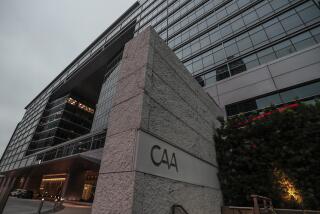POSTSCRIPT : CCA Fights to Live From Day to Day
- Share via
Executives at Creative Computer Applications, a Calabasas-based computer equipment and software company, were hoping things would be different this year. In the last 2 years, CCA had suffered because of marketing and product problems while its losses skyrocketed and its stock fell from more than $2 a share to 16 cents in February. At the time, CCA’s executives conceded that 1988 would be a do or die year for the company.
As 1988 winds down, Creative Computer Applications has edged a lot closer to the grave.
On Friday, the company’s stock was worth a mere 3 cents a share, and according to its latest public filing, the company had only $6,641 in cash remaining.
“That tells the story right there,” said Keith Berman, a former CCA executive. “They are living day to day.”
In CCA’s annual filing to the Securities and Exchange Commission for its fiscal year that ended Aug. 31, the company’s accountants qualified their audit, which is usually a warning flag that the accountants have major concerns about the company’s financial health. CCA’s accountants said the company’s continuing losses and negative cash flow “raise substantial doubt about its ability to continue as a going concern.”
Refused to Extend Deadline
That may have been why in September Union Bank, CCA’s only major lender, refused to extend the deadline for repayment of a $529,000 loan it made to CCA, even though CCA had made all of its interest payments on time.
CCA released a statement that said it would “suffer a severe liquidity problem” if the loan was not restructured or refinanced. The bank has since delayed payment of the loan, which is collateralized by virtually all of CCA’s assets, until August.
But that still leaves the company with the chore of coming up with the cash to repay the loan. Judging by CCA’s latest financial statements, it won’t be easy.
CCA Chairman Bruce Miller and President Steven Besbeck declined several requests for an interview.
CCA sells computer hardware and software used by commercial and hospital laboratories. The labs rely on computer systems to organize the results of medical tests, such as blood counts and urinalyses, which used to be transcribed manually.
But for years CCA has suffered a combination of problems, notably getting reliable parts from suppliers and experiencing a high rate of unpaid bills by its customers. And it didn’t help that cutbacks in health-care funding by federal government agencies forced some labs in the last couple of years to cancel or delay computer purchases.
Narrowed Losses
CCA has tried to turn things around. Because of layoffs and other reductions in overhead, losses were narrowed from $1.8 million in fiscal 1987 to $761,530 in fiscal 1988. And revenue creeped up 4% to $3.38 million from $3.26 million.
But CCA’s underlying financial condition remains grim. In the past, CCA kept itself alive by falling back on its cash reserve. But that nest egg, which was more than $900,000 in fiscal 1986, is down to only several thousand dollars.
And although the company’s total sales grew this year, it was only because of an increase in repair charges. Sales of new products declined more than $100,000. Because the company can no longer afford to market all of its products itself, it was forced to hire a distributor, Curtin Matheson Scientific in Houston.
In its recent SEC filing, CCA said that it “incurred difficulties in 1986, 1987 and throughout 1988, which prevented it from adequately marketing its products to the marketplace.”
That may be why Jim Remley, president of Biovation in Richmond, Calif., a CCA rival, didn’t see CCA trying to sell its products at a recent trade show. “They didn’t even show up,” he said.
Working Capital Falls
Another indicator of CCA’s troubles is that its working capital has fallen from $3.4 million in fiscal 1986 to $277,500 as of Aug. 31. Working capital, or the difference between its assets and liabilities, help a company make ends meet between the time materials for a product are purchased and when the final product is assembled and sold.
Many computer hardware and software companies require hefty doses of working capital, and CCA is no exception. Its products can be expensive, with prices ranging from $1,595 to more than $300,000 each.
CCA’s problems first became overwhelming in 1987 when the computer packages it was selling started suffering constant breakdowns. The major problem was in the disk drives, which store information. CCA didn’t manufacture the disk drives, but they were sold as integral parts of its information system.
In an interview earlier this year, Besbeck said the hardware failed “over 100%,” meaning that every system broke down at least once and some systems broke down more than once.
But competitors and analysts say CCA suffered from more than just bad luck. Sometimes, it was bad management that was to blame for the company’s problems.
‘Did Some Strange Things’
CCA had to cut its stated revenue in 1986 by nearly $1.5 million because orders it had booked as firm did not come through. “They did some strange things a couple of years ago,” Remley said. “You play tricks, you get caught. That stigma stays with you.”
CCA has also been criticized for trying to sell its products nationally rather than concentrating its efforts locally, which would have been easier and cheaper. CCA also lost hundreds of thousands of dollars because it did a poor job checking customers’ credit worthiness.
In addition, joint agreements it signed with several conglomerates didn’t live up to expectations.
CCA is not the only company in its field with problems. “There have been many companies in this industry that have gone bankrupt and gone out of business,” said Dennis Winsten, a medical computer consultant in Tucson, Ariz. “This is the beginning of a shakeout in the industry.”
But that can hardly be of comfort to CCA’s investors or employees.
Last February, Besbeck conceded that CCA was a chancy investment, but he refused to give up hope. “It’s not as risky as lot of other things,” he said. “It certainly is better than sticking your money on the craps table.”
FOR PIX SLUGGED CREATIVE






